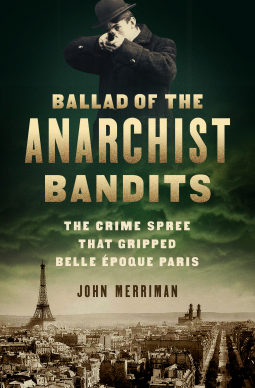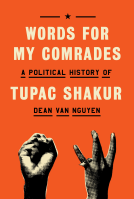
Ballad of the Anarchist Bandits
The Crime Spree that Gripped Belle Epoque Paris
by John Merriman
This title was previously available on NetGalley and is now archived.
Send NetGalley books directly to your Kindle or Kindle app
1
To read on a Kindle or Kindle app, please add kindle@netgalley.com as an approved email address to receive files in your Amazon account. Click here for step-by-step instructions.
2
Also find your Kindle email address within your Amazon account, and enter it here.
Pub Date Oct 03 2017 | Archive Date Oct 03 2017
Perseus Books, PublicAffairs | Bold Type Books
Description
For six terrifying months in 1911-1912, the citizens of Paris were gripped by a violent crime streak. A group of bandits went on a rampage throughout the city and its suburbs, robbing banks and wealthy Parisians, killing anyone who got in their way, and always managing to stay one step ahead of the police. But Jules Bonnot and the Bonnot Gang weren't just ordinary criminals; they were anarchists, motivated by the rampant inequality and poverty in Paris.
John Merriman tells this story through the eyes of two young, idealistic lovers: Victor Kibaltchiche (later the famed Russian revolutionary and writer Victor Serge) and Rirette Maîejean, who chronicled the Bonnot crime spree in the radical newspaper L'Anarchie. While wealthy Parisians frequented restaurants on the Champs-�ysé, attended performances at the magnificent new opera house, and enjoyed the decadence of the so-called Belle �oque, Victor, Rirette, and their friends occupied a vast sprawl of dank apartments, bleak canals, and smoky factories. Victor and Rirette rejected the violence of Bonnot and his cronies, but to the police it made no difference. Victor was imprisoned for years for his anarchist beliefs, Bonnot was hunted down and shot dead, and his fellow bandits were sentenced to death by guillotine or lifelong imprisonment.
Fast-paced and gripping, Ballad of the Anarchist Bandits is a tale of idealists and lost causes--and a vivid evocation of Paris in the dizzying years before the horrors of World War I were unleashed.
Available Editions
| EDITION | Other Format |
| ISBN | 9781568589886 |
| PRICE | $28.00 (USD) |
| PAGES | 304 |
Featured Reviews
 Christine E, Reviewer
Christine E, Reviewer
I live in a neighborhood that has anarchists. Granted, my philosophy is different, and I don’t quite understand why an anarchist would always have the most up to date computer, but hey, they seem pretty nice even if they smell of pot much of the time.
That’s my view of anarchists, who are usually squatters in my neck of the woods.
Needless to say, those types of Anarchists are not the ones that Merriman is writing about. Merriman’s history is about the bandits that committed crimes during pre-WWI France, but it is also about the anarchist movement in France at the time.
Merriman opens his book with the holdup of the Société Générale. This is the Bonnot Gang. Of course, like most criminal’s people who were not involved with the crime spree where caught in the net. It is two of these – Victor Kibaltchiche and Riette Maitrejean.
Merriman takes him time in laying the foundation for the action. He provides more detail of the Belle Époque period, showing the trends and political movements that gave rise to the Anarchist movement as well as the various threads of that movement – illegal activity vs philosophy.
For that is what sometimes gets lost in a discussion of anarchists, at least in the media. They become simply bomb throwing, gun shooting radicals who populate the media. Merriman’s book illustrates that in some cases it was a life style, including vegetarianism and foregoing of items such alcohol and salt.
Maitrejean and Kibaltchiche are at the heart of the story, for they seemed to have known everyone, and part of the drama of the story is the dragnet that captures are in its wake, regardless of involvement or not. It is their fate and the fate of their family that moves the story forward. Merriman’s prose is invigorating enough to carry the reader along. There are also little details, such as the horror of balsamic vinegar that actually illustrate the dedication to the cause. Honesty, you must strongly believe in something if you are willing to give up such a wonderful thing. Such small details actually make the history more interesting and in some ways more real.
Considering the current political climate, the book might be timelier than intended. It is also to Merriman’s credit that he does not romanticize the Illegalistes. Despite the title the book isn’t one of the romantic retellings of an outlaw life. In many ways, while the reader does end up feeing some sympathy for the bandits, or at least a few of them, the cost to others not involved in the Illegalistes is not ignored. This is done by the not only the use of outsiders but also by showcasing the debates within the movement itself.


















